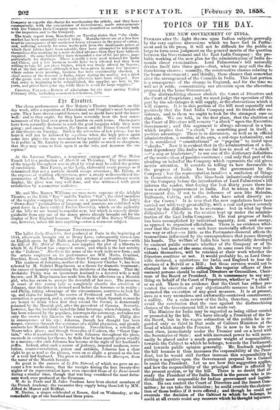Viratrrs.
The cheap performances at Her Majesty's Theatre terminate on this day week, after a repetition of Piccolomini and Giuglini's most favourite parts. They have drawn capital houses, and no doubt have paid the lessee well : and so they ought, for they have certainly been the best enter- tainments of the kind ever given in London on such terms. Opem-goers have been naturally desirous to catch the good bargains while they were going ; and among the number, the Queen and the Prince Consort were at this theatre on Tuesday. Such is the attraction of low prices ; but we hope it will not be followed by repulsion when the high prices again come into play—the one movement being natural as well as the other. Is it politic in Mr. Lumley to accustom the public so much to cheapness, that they may come to look upon it as the rule, and dearness the ex- ception ?
At the Lyceum Theatre, a temporary engagement of Miss Helen Faucit led to a production of Macbeth on Thursday. The performance of the tragedy throughout was marked by what may be called the genius of carefulness. Miss Faucit, as the Lady, elaborated every passage as if determined that not a particle should escape attention ; Mr. Dillon, at the expense of startling effectiveness, gave a steady well-considered im- personation of Macbeth. Without any attempt at extraordinary scenic display, the piece was very well done, and was witnessed with great satisfaction by a numerous audience.
Mr. and Mrs. Barney Williams arc once more supreme at the Adelphi Theatre, as the Irish " Boy " and the Yankee " Gal"; the chief members of the regular company being absent on a provincial tour. The lady's "Down-East" peculiarities of language and manners are exhibited with' great force in a farce entitled Yankee Courtship, which on the authority of the bills we are bound to consider new, but which is scarcely distin- guishable from any one of the dozen pieces already brought out for the display of New England humour. The vivacity of Mrs. Barney Williams can, however, infuse life into anything—even a worn-out subject.
PARISIAN THEATRICALS.
The ballet Lady Heneiette, first produced at Paris in the beginning of 1844, afterwards brought out at Drury Lane, subsequently turned into an English opera by Mr. Balfe and played—again at Drury Lane—with the title of The _Maid of Honour, now supplies the plot of a libretto to which M. de Flotow has composed music, and which is the last novelty at the " Helens." Martha is the name of the work in its new form ; and the artists employed on its performance are MM. Mario, Graziani, Zucchini, Rossi, and Mesdemoiselles Saint Irrisain and Nantier-Didiee.
The madness of Johanna, mother of the Emperor Charles Y, has been selected by M. Gabriel Hugelmann as a theme for dramatic treatment; the causes of insanity constituting the incidents of the drama. That the Archduke Philip was an inconstant husband to a devoted wife is well known; and M. Hugelmann has made him fix his affections on a Moorish girl, who has sworn to avenge the downfall of her race. The presence at court of this young lady so completely absorbs the attention of Johanna, that the latter is deemed mad before she becomes so in reality ; and Philip, taking advantage of the circumstance, contrives to lock her up, and claim for himself the crown of Ferdinand and Isabella. His coronation is prepared, and a certain cup, from which Spanish monarchs are bound to drink when first they ascend the throne, is dexterously poisoned by the Moorish girl, after the precedent of Gamma. Scarcely, however, has the Archduke tasted the fatal beverage, when Johann; who has been released by the populace, interrupts the ceremony, and takes not only the crown but likewise the contents of the goblet. Philip dies in consequence of his sip ; Johann; though her draught has been deeper, recovers through the assistance of a skilful physician, and piously converts her Moorish rival to Christianity. Nevertheless, a rebellion of Moors takes place ; and though Gonzalvo of Cardova, the "Great Cap- tain," who is passionately in love with Johanna throughout the piece, succeeds in securing her throne, he finds that he has merely given royalty to a maniac,—for such Johanna has become at the sight of her husband's coffin. Indeed, after such a course of jealousy, imputed madness, revo- lution, counter-revolution, poison and antidote, Johanna has a clear right to go as mad as she pleases, even on so slight a ground as the loss of a very bad husband. The piece is entitled Aidera la Moresque, from the name of the Moorish heroine.
So great is the success of be File Nature?, of which we gave an ac- count a few weeks since, that the receipts during the first twenty-five nights of its representation have even exceeded those of be Demi-monde daring a similar time, though that was long considered the most fortu- nate work ever produced at the Gymnase. M. de la Pradc and M. Jules Sandean have been elected members of the French Academy: the vacancies they supply being those left by MM. Alfred de Mnsset and Briffaut.
M. Darius, a singer celebrated at Rouen, died on Wednesday, at the remarkable age of one hundred and three years.


































 Previous page
Previous page